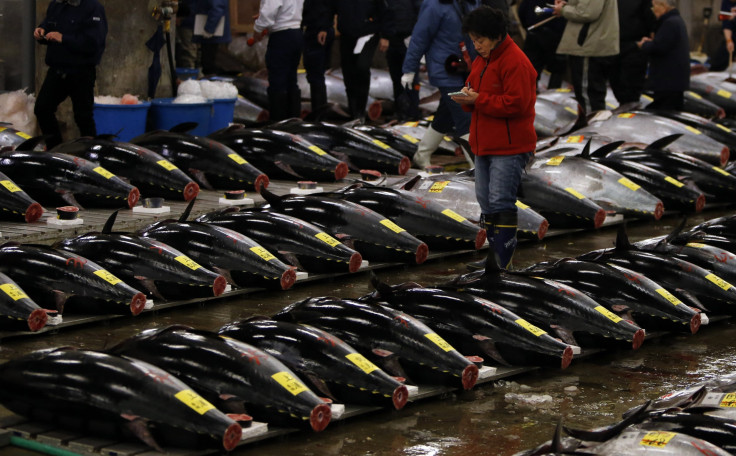Overfishing Causes Ecosystems To ‘Unravel,’ Fish Populations Can’t Recover After ‘Tipping Points’ Reached

As improvements in technology and large-scale fishing methods have made commercial fishing more efficient, faster and more profitable, fish populations around the world have suffered. Starting in the early 1800s, humans have harvested several species of fish to the brink of extinction. Overfishing is an ecological disaster that affects entire ecosystems, and a new study highlights this point in bright, neon color.
Researchers in the U.S. analyzed fisheries data from around the globe, examining the cumulative effect that occurs when overfishing depletes a particular population. The results of their investigation, described in a paper published in the journal Proceedings of the National Academy of Sciences in December, underscore the effect that eliminating one species has on the ecosystem as a whole. When one fish is no longer there, the entire ecosystem changes, researchers contend, and once that “tipping point” has been reached, the species can no longer bounce back.
“You don’t realize how interdependent species are until it all unravels,” Felicia Coleman, director of the Florida State University Coastal and Marine Laboratory and a co-author on the study, said in a statement.
The authors noted one particular example of ecosystem collapse that occurred off the coast of Namibia in southwest Africa. In the 1970s, the northern Benguela ecosystem completely changed as stocks of anchovy and sardines plummeted. With anchovy and sardines on the way out, bearded goby and jellyfish stepped in to take their place. Which animals suffered the most? It was actually the populations of African penguins and Cape gannets that bore the brunt of overfishing in the region. The birds couldn’t survive on goby and jellyfish, and as a result, their numbers declined by 77 percent and 94 percent, respectively.
"When you put all these examples together, you realize there really is something important going on in the world's ecosystems," Joseph Travis, a biological science professor at Florida State University and one of the study’s co-authors, said in a statement. "It's easy to write off one case study. But, when you string them all together as this paper does, I think you come away with a compelling case that tipping points are real, we've crossed them in many ecosystems, and we'll cross more of them unless we can get this problem under control."
Part of the problem, scientists say, is consumer ignorance about the fish they eat and where it comes from. Also, researchers warn that the fishing industry needs a massive overhaul, otherwise the world’s food supply will collapse.
“What we have today are multinational fleets of roving bandits that conduct serial depletions and move to more productive grounds,” Robert Steneck from the University of Maine and a co-author of the study told Quartz. “People in the U.S. are insulated from the reality of overfishing by seeing fish well stocked in their grocery stores.”
“Overfishing and environmental change have triggered many severe and unexpected consequences,” the authors note in the study. “As existing communities have collapsed, new ones have become established, fundamentally transforming ecosystems to those that are often less productive for fisheries, more prone to cycles of booms and busts, and thus less manageable.”
Researchers say a “lack of appreciation” on the part of fisheries and their management for the complexity of interspecies relationships is greatly affecting how we treat our world’s stocks of fish.
“Ecologists have come to understand that networks of interacting species exhibit nonlinear dynamics and feedback loops that can produce sudden and unexpected shifts,” they wrote. “We argue that fisheries science and management must follow this lead by developing a sharper focus on species interactions and how disrupting these interactions can push ecosystems in which fisheries are embedded past their tipping points.”
Fishing experts generally understand the effects overfishing have on fish populations and ecosystems alike, but scientists say more research is needed. A 2006 study in the journal Science estimated that by 2048, all the world’s fisheries will have collapsed, if fishing rates remain unchanged.
© Copyright IBTimes 2024. All rights reserved.





















